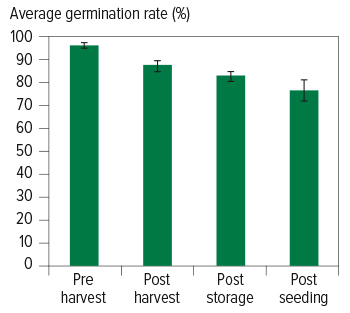Key points
- Lupin seed integrity can influence germination and, ultimately, yield but there are both genetic and management aspects that affect this
- A survey of grower-retained seed in 2019-20 season has shown a 19 per cent decline in lupin germination, on average, from pre-harvest to post-seeding
- Investigations into mechanical handling effects on seed integrity are continuing
Although retaining seed can reduce sowing costs, poor lupin crop germination from retained seed can negate this saving and has become more common for growers in low to medium-rainfall zones of the northern agricultural region of Western Australia.
To better understand the cause, the Liebe Group, based in Dalwallinu, has been undertaking research through a two-year GRDC-invested project, although answers are proving elusive.
The project aims to assess seed integrity by conducting germination tests and evaluating crop establishment to assess the effect that seed characteristics and multiple handling practices might have on the integrity of lupin seed coat.
The problem is complex because many factors can affect seed integrity, including manganese deficiency of the seed, variety, harvester settings and treatment of seed by augers.
This project looks to determine which factors affect seed integrity most and where in the handling processes practical changes can be made to improve germination.
Survey of retained seed
Initial results from the 2019-20 season have shown a 19 per cent decline in lupin germination, on average, from pre-harvest to post-seeding (Figure 1). This trend was identified through germination test results from 27 seed sources provided by participating growers.
Figure 1: Average germination percentage of 27 lupin seed sources, each tested at four different stages; pre and post-harvest 2019, and post-storage and post-seeding 2020. Error bars are ± 1 S.E.

Source: Liebe Group
The sample set included six different varieties – Barlock, Coramup, Gunyidi , PBA Jurien , Mandelup and Coyote – and were obtained from lupin crops grown in 2019 that either had foliar, compound or no manganese applied.
While manganese deficiency is thought to be a significant factor affecting the decline in germination, all samples showed adequate manganese levels above the standard minimum threshold of 15 milligrams per kilogram, despite variation in manganese application.
As the 2019 season received below-average rainfall, it would be worth testing manganese levels in lupin seed crops that experienced higher rainfall and yielding situations.
There were no clear varietal differences in lupin seed integrity, but this could require further investigation as well.
Mechanical damage
The mechanical handling factors identified throughout the harvest, storage and seeding process are subject to ongoing investigation, with research underway to pinpoint where the production system can be improved.
Investigations of various header rotor speeds have revealed no clear trends. Targeted trial work was done in December 2020 with three rotor speeds, identified as the most common, at four sites with no significant correlation between treatments.
Analysis of the results from these grower-scale demonstrations suggest that rotor speed may not have a significant impact on germination within the current range of standard grower practice.
Ongoing work
The genetic and management factors affecting lupin seed integrity are obviously complex and, although some factors have been eliminated, there is a need for further work to unravel the puzzle.
To this end, the Liebe Group also conducted an auger use and condition trial in March 2021; however, results are not yet available. The aim of this experiment is to compare the effect of one to 10 consecutive auger journeys on establishment percentages. This testing will be duplicated across an auger with old worn blades and an auger with new blades, to assess the impact that auger conditions might have on lupin seed integrity.
Six growers are participating in another season of data collection and research, including three enterprises that experienced significant losses in germination, and three that maintained high germination rates throughout the initial testing.
The Liebe Group also plans to develop case studies outlining what management practices can be changed for growers to improve or maintain lupin seed integrity to increase lupin productivity. These will be made available on the Liebe Group website (liebegroup.org.au) in early to mid 2022.
More information: Katrina Venticinque, 08 9661 1907, eo@liebegroup.org.au

























































